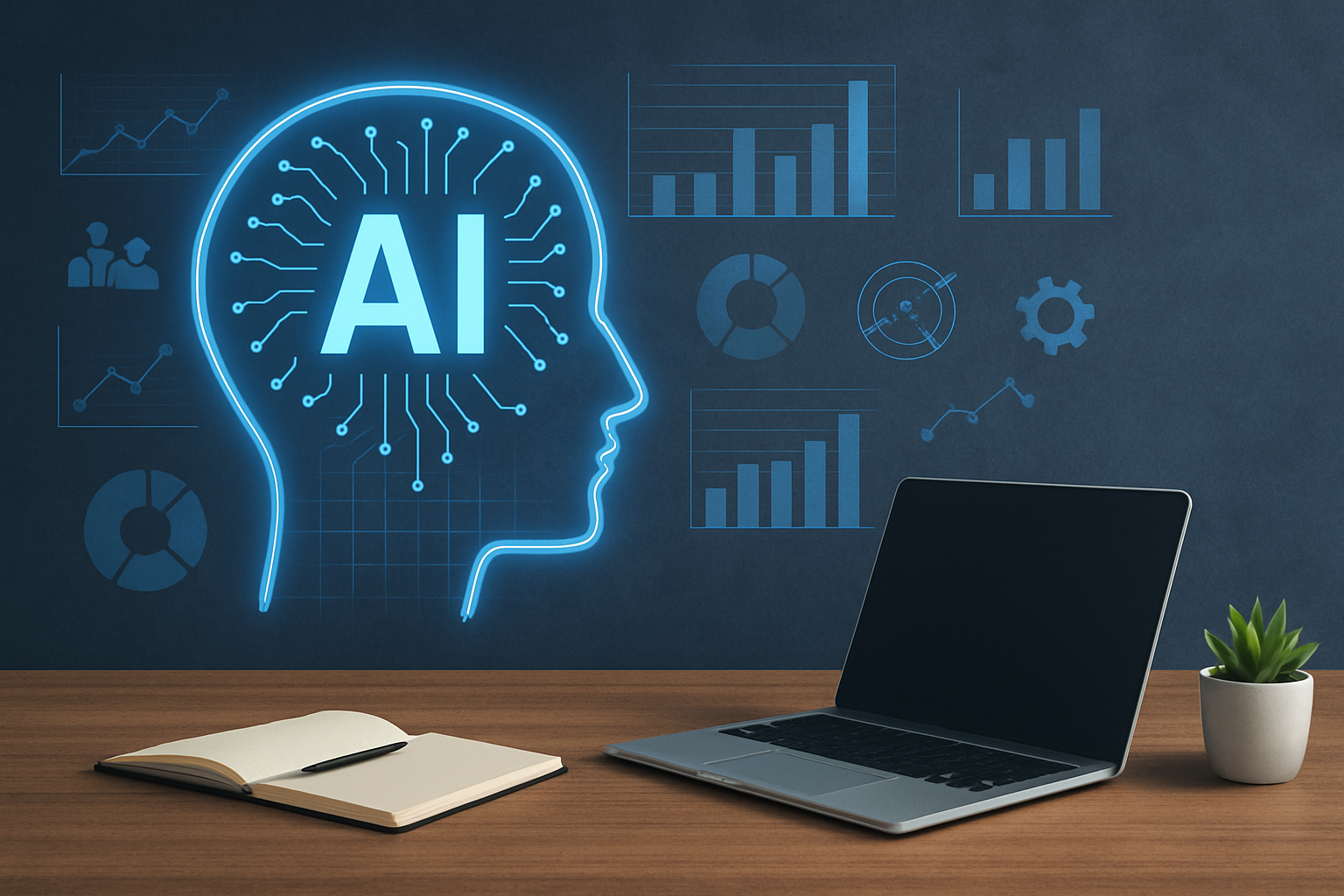This trend is accelerating with the rise of Large Language Models (LLM) AI, a popular form of AI in natural language processing. LLMs allow AI to communicate, answer questions, and provide contextual recommendations. Examples include OpenAI GPT, DeepSeek, Gemini, and Copilot, which can be used directly without the need for extensive AI model development from scratch. This approach offers significant benefits of using existing LLMs—it's far more cost-effective and can be quickly applied to real business cases. Building a custom AI model from the ground up, on the other hand, requires massive investment in data, research, and infrastructure, with development costs for a new LLM reaching between USD 100 million and 500 million.
AI Adoption Trends & Business Impact
The future of AI in business is already here, and its adoption is spreading across industries. A global McKinsey survey found that 78% of organizations are already using AI in at least one function, showing that this technology is no longer just an experiment. The Stanford AI Index report also confirms that the trend of AI adoption continues to rise year after year.
In Indonesia, AI adoption is showing positive momentum. A study by AWS and Strand Partners revealed that around 28% of Indonesian businesses have adopted AI, with more than half of them reporting a revenue increase of 16% on average after implementation. From an impact perspective, McKinsey found that companies that invest seriously in AI can increase their ROI by 10–20% on average. A BCG report also shows that "AI winning" companies can achieve an ROI up to 2.1 times higher than their competitors. All of this confirms that AI is not just hype; it is real driver of business growth, efficiency, and innovation.
AI for Business: Build Your Own or Integrate?
When adopting AI, companies typically face two main choices:

Not Sure Where to Start with AI? Talk to Our Experts Today.
AI Use Cases in Various Industries
AI’s ability to streamline operations and reduce manual work is bringing real value across many sectors. Here are some examples of machine learning use cases and Generative AI use cases that show what AI is capable of:
1. AI-Powered Traffic Light Management
Industry: Public Service
Traffic congestion is a major problem in big cities. AI can control traffic lights dynamically based on real-time road conditions. In Jakarta, 65 CCTV cameras are connected to an Intelligent Traffic Control System (ITCS), and a pilot project with Google involves 20 AI-based traffic lights. A study from Udayana University found that AI can improve traffic flow by up to 15% and reduce travel time during peak hours.
Business Impact: Smoother mobility, energy efficiency, and cost reduction from congestion.
2. AI for Counterfeit Product Detection
Industry: Retail & FMCG
Counterfeit products are a big challenge in e-commerce. AI in retail uses computer vision to scan thousands of product listings automatically, analyzing text, images, and metadata to identify suspicious patterns. The OECD reports that 3.3% of global trade consists of counterfeit products, with FMCG being a heavily impacted category. By using AI, companies can quickly flag illegal products, protect their brand reputation, and save costs from fraudulent products.
Business Impact: Brand protection, increased customer trust, and cost savings from counterfeit product losses.
3. Predictive Maintenance for Factory Machinery
Industry: Manufacturing
Food and beverage production machines run almost non-stop, so downtime is very costly. AI production uses predictive maintenance to forecast potential machine failures before they happen, allowing for timely repairs. A Researchgate study shows that predictive maintenance can lower maintenance costs by 20–30% and reduce machine downtime by 15–25%.
Business Impact: Stable production, longer machine lifespan, and consistent product quality.
4. AI for Supply Chain Disruption Monitoring
Industry: Logistics & Supply Chain
Global supply chains are vulnerable to disruptions from natural disasters, geopolitical conflicts, or sudden market changes. AI is used to monitor external data—like news, social media, and weather reports—and combine it with internal company data to provide early warnings. Deloitte emphasizes that AI plays a vital role in reducing complexity and improving a company's ability to predict disruptions.
Business Impact: Faster disruption detection, more reliable distribution, and a stronger supply chain.
5. AI for Tenant Performance Analysis
Industry: Retail & Commercial Property
AI footfall analytics helps mall managers understand visitor behavior in detail—number of visits, walking patterns, duration of stay, and tenant performance. This data helps them create more effective tenant mixes and promotions. A Deloitte report highlights how AI in retail changes operations and enables better customer experience management.
Business Impact: More accurate tenant strategies, better-targeted promotions, and a more satisfying shopping experience.
6. AI for Hyper-Personalized Dynamic Pricing
Industry: Aviation & Hospitality
In aviation and hospitality, AI is transforming how prices are set. An AI system can adjust airfares and room rates in real time based on demand, booking patterns, seasonal trends, competitor prices, and inventory levels. By enabling smarter business decision-making, AI-driven dynamic pricing can boost profitability by up to 22%.
Business Impact: Higher occupancy and load factors, optimized revenue per seat or room, and more responsive pricing strategies.
7. Other High-Impact AI Use Cases
Financial Services: AI uses cases in financial services include using AI chatbots for customer service to provide 24/7 support and act as a AI helpdesk. AI can also enhance customer experience with AI by analyzing data to make personalized product recommendations and detect fraud.
Healthcare: AI in healthcare and Medical AI are transforming the industry. AI medical imaging and AI medical diagnosis are used to analyze images to detect abnormalities, prioritize urgent cases, and even predict patient outcomes. This helps professionals deliver smarter, faster, and more personalized care.
Education: What is AI in education? AI is used to create intelligent tutoring systems for personalized learning, automate grading, and provide 24/7 support via chatbots. This helps teachers and schools streamline operations and focus on what matters most.
How commsult Helps
So, what can AI do for your business? The answer is simple: enhance customer experience with AI, streamline operations, and reduce manual work. To successfully implement AI, you need a partner who understands both the technology and your business.
As an AI implementation partner, commsult is here to help you. We are not just a software vendor but a strategic partner in your company’s digital transformation journey. We offer comprehensive services, from AI integration to custom AI development that are tailored to your industry, whether it's manufacturing, retail, logistics, or finance.
We specialize in exploring and applying the latest advancements in AI technology. Our team can design custom models and intelligent assistants tailored to your business processes. We also integrate workflow automation and collaboration tools to build end-to-end solutions that deliver measurable ROI.
Our focus is on delivering real business value: fast, scalable implementation with measurable ROI. We believe that AI should be a real business asset, not just a technical experiment.
Discover How AI Can Boost Your Business. Start With commsult Today!

)) int 1f53e05f-453b-4251-9de2-e3e8970258be_1_11zon.jpg)
_11zon.jpg)
